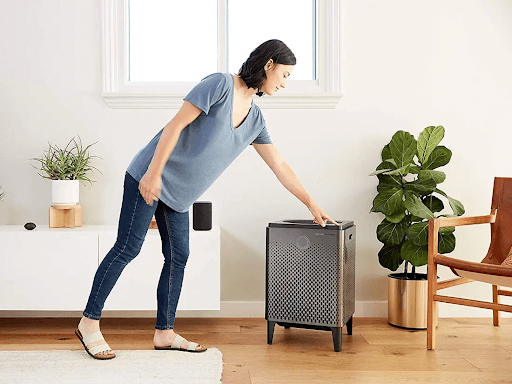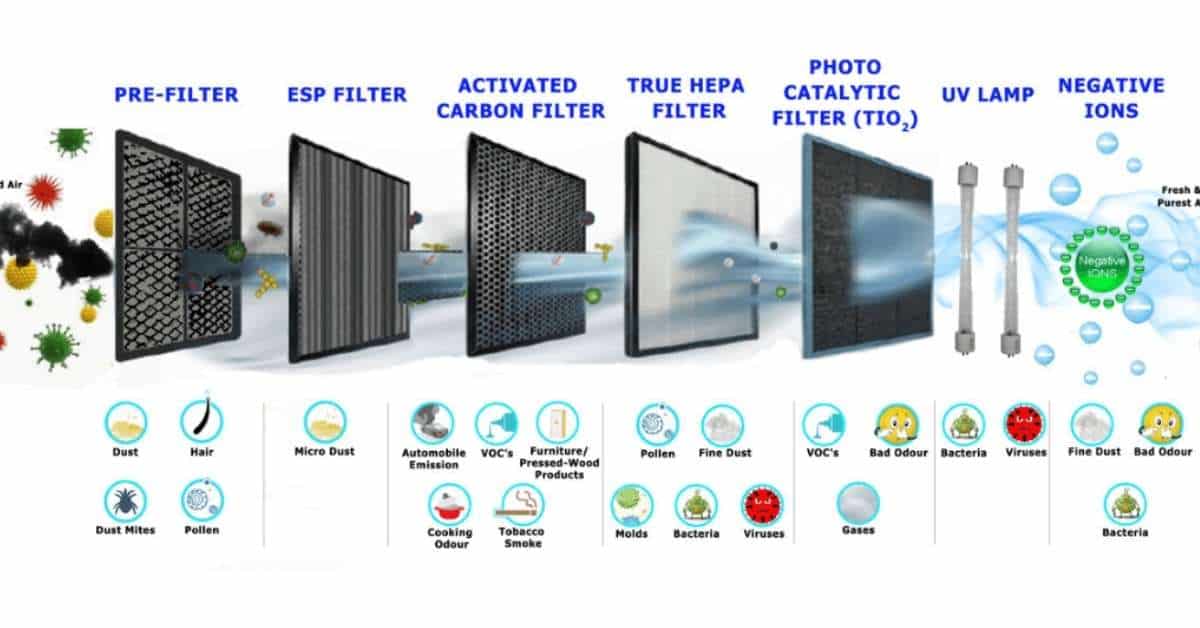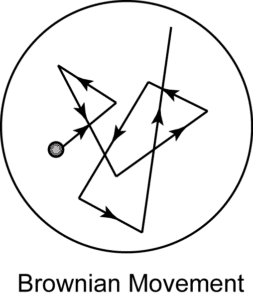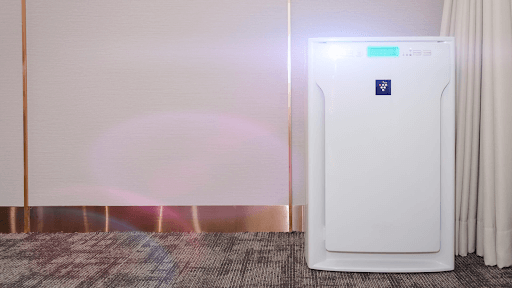Air purifiers are said to capture and kill viruses, such as COVID-19. Is this a fact? While the short answer is surprisingly YES , we’ll further dignify that answer with the following scientific basis.

A couple of things you should know first is that:
The COVID-19 virus is close to a 0.125 micron size (125 nanometers). Viruses this small may not be easily filtered from the air through a standard filter.
Hence, if you want to keep a safer indoor environment free from suspended viruses, use a trusted air purification brand with the right technology.
Air Purifiers featuring HEPA filters can filter contaminants down to 0.3 microns .
Furthermore, high performance UV-C LED Lamp, such as in HisoAir , sterilizes and eliminates organisms and viruses. Basically, the UV light unfolds the protein coating of the virus, effectively inactivating it.
From here, let’s elaborate.
How are Airborne Diseases Transmitted?
In October 2020, the Centers for Disease Control (CDC) released its stance on how the Covid-19 virus is transmitted .
It says: “the virus can be transmitted in particles and small droplets lingering in the air for a few minutes to even hours”.
This means the CDC agrees with the airborne transmission of the virus through suspended aerosols or splatters.
Add to that, many people today tend to work-from-home or stay indoors due to the increasing number of COVID cases, lockdowns and curfews. This may render poor ventilation and air quality as more people are cramped up in homes.
And hence, the odds of spreading communicable diseases indoors increases due to poor air movement.
3 Ways Covid-19 Spreads Through Airborne Transmission
There are 3 ways under which COVID-19 airborne transmission can happen according to the CDC:
- Enclosed areas – when a person is exposed in an enclosed space right after an infectious person has left that place.
- Extended exposure with harmful particles – being exposed to suspended droplets in the space.
- Poor ventilation or inadequate air handling units creating suspended respiratory particles and droplets.
This leads us to believe that air purification systems such as air purifiers, disinfection machines and air cleaners play a vital role in cleaning what we breathe in.
How Do Air Purifiers Work?

Air purifiers are equipped with several filter technologies to sanitize and clean the air from pollutants, suspended particles, allergens and viruses.
This means it doesn’t only remove the particles by filtering them, it also sanitizes and kills viruses.
Air purifiers may feature HEPA filters, activated carbon, ionizers or UV light, or a combination of all. The combination of filters determines what type of particles are exactly eliminated from the air. Some types of air cleaners only trap air contaminants, while others are designed with filters that kill and neutralize bacteria, viruses and foul smells.
HEPA Filters and the Coronavirus
Okay, so a lot of people get really confused and misinformed whether HEPA filters can capture small particle sized viruses, such as the Coronavirus.
HEPA filters can remove 99.97% of particles in the air down to the size of 0.3 microns. The COVID-19 is between 0.06 microns to 0.14 microns in diameter.
This happens through Diffusion. According to a scientific study from NASA , HEPA filters can virtually capture 100% of particulates.
Turns out, the Coronavirus is so small and light that it gets bounced around when hitting gas molecules.

How the Coronavirus “fly” in a random, zigzag pattern through the Brownian movement
Due to this zigzag motion, whenever the virus travels through the HEPA filter, they get stuck on its fibers.
This means, particles can be trapped in HEPA filters, even down to the size of 0.1 microns, including the COVID-19 virus. Once it gets trapped, the HEPA filter holds the viruses captive so they cannot be brought back in the air.
But are the viruses killed? Coronavirus on a HEPA filter may virtually last 48 to 72 hours before it dies or inactivated.
How Does UV light Work in Killing Viruses Like COVID-19?
Another type of air cleaning feature is the integration of UV light. UV radiation is detrimental in killing and eliminating bacteria and living microbes. However, it also depends on:
- how the Ultraviolet light is used and,
- how long the virus is exposed to it.
If the UV lamp is arranged as a sterilizing component which shines light through the trapped bacteria, this is proven to be effective. But if the intake air is only passed through the UV light, it may not be effective in killing the virus.
Air Disinfection Purifiers from HisoAir are actually integrated with 4 stages of cleaning, which includes HEPA filters, Nylon pre-filters, activated carbon and UV lamps to effectively kill contaminants.
Do Ionizers Kill Viruses?

Some air purifiers have ionizers as part of their air cleaning technology. Ionizers work by inducing electrical charges on the particles in the air.
These particles are then pulled toward objects and surfaces with an opposite charge. This can be your furniture, carpet, floor or ceiling. There are also air purifiers which emit negative ions to attract ions with positive charges. This neutralizes the harmful contaminants. However, this solution induces ozone emissions which is harmful for the environment.
You see, viruses may be fragile, but it won’t just take negative charges to destroy them. Hence, ionizers cannot be used to single-handedly kill COVID-19. But there’s a catch.
Since viruses may cling onto contaminants in the air, the ionizer can prevent the virus from reaching you.
By example, this study tells us how researchers use an ionizer to prevent guinea pigs from getting sick from influenza virus.
Photocatalytic, Carbon, Catechin Filters
There are other filters used in different air purifier brands such as photocatalytic filters, carbon filters or catechin filters.
- Air purifiers with photocatalytic filters can trap and kill viruses and bacteria. Furthermore, it can break them down through oxidation of the ions.
- Carbon filters or activated carbon filters in air purifiers are used in trapping volatile organic compounds, fumes, smog, odors.
- Catechin filters have antibacterial and antifungal features but are rarely found in many air purifier brands.
Are These Filters & Sterilizers Safe to Use?
Not exactly. Well at least if you’re not directly exposed to ozone, then that is fine. HEPA filter air purifiers with UV light and ionizers are okay to use.
However, inhaling ozone is a different story. It can cause coughing, irritation on your throat and allergies. It can also cause lung damage and aggravate breathing problems and asthma. This means that if you have lung problems, you shouldn’t use air purifiers with ozone or ionizers.
Research has also found that ozone generators are not that effective in preventing molds or inhibition of bacteria. That’s why it is unsafe to use in hospital rooms and other healthcare units.
Conclusion
We hope this article helped you understand how certain types of air purifiers can kill viruses and prevent the spread of COVID-19 through airborne transmission.
As we’ve pointed out, air purifiers with HEPA filters can capture even the tiniest range of viruses, such as the Coronavirus. These viruses may cling on the HEPA for 48 to 78 hours before dying.
But the most effective air purification systems are those with UV light, which works by destroying these harmful contaminants. Plus, UV light is not harmful, unlike ozone generators and ionizers purifiers.
If you want to buy wholesale H13 HEPA Air Purifiers with UV light , HisoAir can help you. We are an OEM/ODM with 15 years experience and an ISO certified factory.




